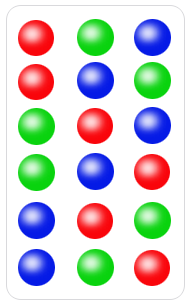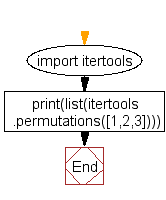Python: Generate all permutations of a list in Python
Generate All List Permutations
Write a Python program to generate all permutations of a list in Python.
In mathematics, the notion of permutation relates to the act of arranging all the members of a set into some sequence or order, or if the set is already ordered, rearranging (reordering) its elements, a process called permuting. These differ from combinations, which are selections of some members of a set where order is disregarded.
In the following image each of the six rows is a different permutation of three distinct balls.
Visual Presentation:

Sample Solution:
Python Code:
# Import the 'itertools' module, which provides various functions for working with iterators
import itertools
# Use 'itertools.permutations' to generate all permutations of the list [1, 2, 3], and convert the result to a list
# This will produce all possible orderings of the elements in the list
print(list(itertools.permutations([1, 2, 3])))
Sample Output:
[(1, 2, 3), (1, 3, 2), (2, 1, 3), (2, 3, 1), (3, 1, 2), (3, 2, 1)]
Explanation:
In the above exercise -
import itertools -> Import the itertools module.
list(itertools.permutations([1,2,3])): Generate all permutations of the list [1,2,3] using the permutations() function from the itertools module. The permutations() function returns an iterator, so we need to convert it to a list to print it.
Flowchart:

For more Practice: Solve these Related Problems:
- Write a Python program to generate all possible subsets of a given list.
- Write a Python program to generate all combinations of a given list of numbers.
- Write a Python program to generate all possible anagrams of a given list of characters.
- Write a Python program to generate all unique permutations of a list that contains duplicate elements.
Go to:
Previous: Check if each number is prime in a list of numbers.
Next: Difference between the two lists.
Python Code Editor:
What is the difficulty level of this exercise?
Test your Programming skills with w3resource's quiz.
